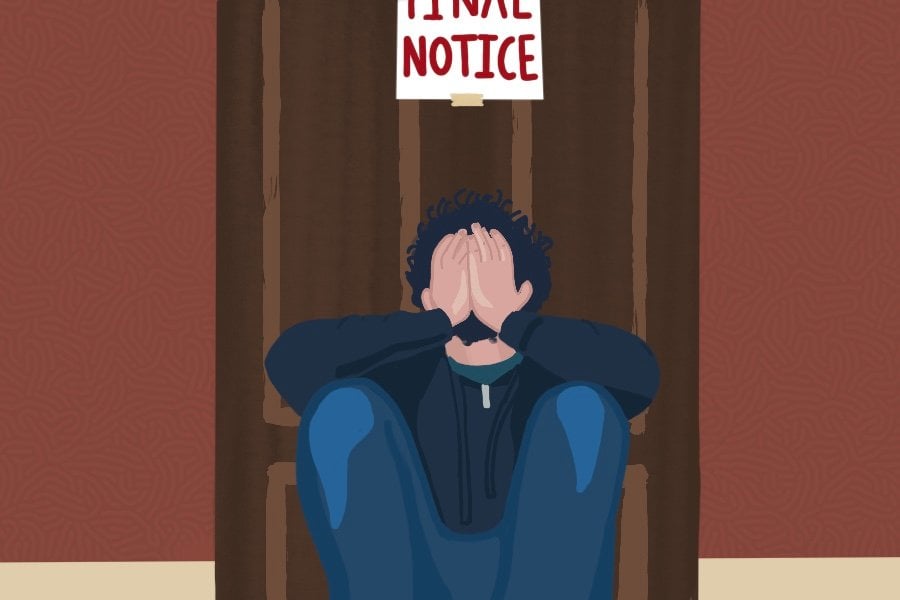Council approves grant for rent assistance program
Illustration by Catherine Buchaniec
In response to the financial impact of the COVID-19 pandemic, Open Communities will help residents register for up to 15 months of county-subsidized rent relief, plus utility relief, until April 2.
January 12, 2021
City Council voted unanimously Monday to approve a $500,000 grant to Connections for the Homeless for a rent assistance program.
The program is expected to help between 40 and 70 households across the city for up to six consecutive months. Connections for the Homeless will process and approve applications prioritized mainly by census tract, income level and the amount of rent owed.
When the current federal rent moratorium is set to expire at the end of January, over 3,000 renter households in Evanston may be at risk of eviction, according to the November Week 20 US Census Household Pulse Survey for the Chicago metro area and the 2019 American Community Survey data.
According to the same Pulse Survey, the pandemic is disproportionately impacting people of color when it comes to rent: 33 percent of Black, 49 percent of Hispanic and 60 percent of multiracial respondents were behind on rent or likely unable to pay next month’s rent. Only 18 percent of White respondents answered the same. Households with incomes under $50,000 are more likely to face problems with rent, according to the survey.
Last year, residents received some relief through the city’s General Assistance Program and Emergency Assistance Services Program, as well as through programs with the Illinois Housing Development Authority and Cook County. At the time, housing and grants division manager Sarah Flax said these forms of aid were unlikely to be sufficient to meet all residents’ needs, leaving the threat of eviction looming for some.
At Monday’s meeting, Flax said the program will use a priority-driven phase approach to the application process, rather than a lottery system.
“In the previous allocations of funding that have gone to rent assistance, only 8 percent have had any kind of priority for either lower-income or more vulnerable people and nationwide,” Flax said. “Most of them have used the lottery system, and have been frustrating to a lot of applicants because they all apply, and then they wait for months and months to get help.”
First priority will be given to residents living in census tracts most impacted by COVID-19, which include parts of the 2nd, 5th, 8th and 9th Wards. This first phase will be open for two weeks, and will also prioritize lower-income residents who owe larger amounts of rent.
The second phase will depend on the amount of applicants and funds distributed in the first phase. If enough funds remain, residents from census tracts in the 2nd and 4th Wards with small landlords — local landlords who own 10 or fewer units — may also be eligible to apply.
Ald. Cicely Fleming (9th) expressed concern about funding limitations. The Reba Place Development Corporation, a local nonprofit that provides housing, contains more than 10 units of housing, which is over the maximum amount permitted for aid eligibility. However, Fleming said the organization is unable to support residents who are behind on their rent. She said she hopes the rent assistance program will provide some form of aid to the Reba Place.
Carlis Sutton, a longtime Evanston resident and small landlord from a high-priority census tract, said in public comment he needs help covering the cost of tenants’ unpaid rent.
“I’m begging you, for these small landlords in this area, to please give us first, access to apply for these funds, and secondly, some relief with the current tax bills and things that are happening,” Sutton said. “I need assistance, and I need it now.”
Since Connections for the Homeless is overseeing the application process, there will be no requirements to document citizenship or legal status. Funding for the program will come from the City’s Coronavirus Aid, Relief, and Economic Security Act grant.
Email: [email protected]
Twitter: @delaneygnelson
Related Stories:
— Despite city, community response, eviction threat persists
— White supremacist zoom-bombs 5th ward aldermanic candidate Carolyn Murray endorsement call


